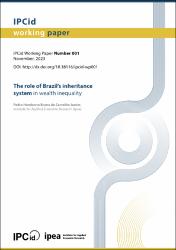Please use this identifier to cite or link to this item:
https://repositorio.ipea.gov.br/handle/11058/13797Full metadata record
| DC Field | Value | Language |
|---|---|---|
| dc.contributor.author | Carvalho Junior, Pedro Humberto Bruno de | - |
| dc.coverage.spatial | Brasil | pt_BR |
| dc.date.accessioned | 2024-05-20T12:58:50Z | - |
| dc.date.available | 2024-05-20T12:58:50Z | - |
| dc.date.issued | 2023-11 | - |
| dc.identifier.citation | CARVALHO JUNIOR, Pedro Humberto Bruno de. The Role of Brazil’s inheritance system in wealth inequality. Brasília: Ipea, nov., 2023. (IPCID Working Paper, 001). DOI: http://dx.doi.org/10.38116/ipcid-wp001 | pt_BR |
| dc.identifier.uri | https://repositorio.ipea.gov.br/handle/11058/13797 | - |
| dc.description.abstract | O estudo debate o papel do sistema de herança do Brasil na desigualdade de riqueza. As leis civis brasileiras têm incentivado a transferência de propriedade para os filhos devido à regra dos herdeiros necessários. Pesquisas domiciliares mostram que os 5% mais ricos da população tiveram menos filhos e mais capital para transferir para seus herdeiros sob mínima tributação, especialmente durante a ditadura militar (1964-1988), quando apenas transferências de imóveis eram tributadas. | pt_BR |
| dc.language.iso | en-US | pt_BR |
| dc.publisher | Instituto de Pesquisa Econômica Aplicada (Ipea) | pt_BR |
| dc.publisher | International Policy Centre for Inclusive Development (IPCID) | pt_BR |
| dc.title | The Role of Brazil’s inheritance system in wealth inequality | pt_BR |
| dc.title.alternative | IPCID Working Paper 001 : The Role of Brazil’s inheritance system in wealth inequality | pt_BR |
| dc.type | Working Paper IPCid | pt_BR |
| dc.rights.holder | Instituto de Pesquisa Econômica Aplicada (Ipea) | pt_BR |
| dc.source.urlsource | https://www.ipea.gov.br | pt_BR |
| dc.location.country | BR | pt_BR |
| dc.description.physical | 21 p.: il. | pt_BR |
| dc.subject.vcipea | IPEA::Quadro Institucional::Direito. Legislação::Direito e Legislação – Geral::Herança | pt_BR |
| dc.rights.license | The text and data in this publication may be reproduced as long as the source is cited. Reproductions for commercial purposes are forbidden. The International Policy Centre for Inclusive Development disseminates the findings of its work in progress to encourage the exchange of ideas about development issues. The papers are signed by the authors and should be cited accordingly. The findings, interpretations, and conclusions that they express are those of the authors and not necessarily those of the Centre or the Government of Brazil. | pt_BR |
| dc.subject.keyword | Desigualdade de riqueza | pt_BR |
| dc.subject.keyword | Elites | pt_BR |
| dc.subject.keyword | Herança | pt_BR |
| dc.subject.keyword | Imposto sobre herança | pt_BR |
| ipea.description.additionalinformation | The International Policy Centre for Inclusive Development (IPCid) is a pillar for the internationalisation of public policy within the Brazilian public sector. The Centre promotes knowledge sharing on public policies between Brazil and its partners, while strengthening South-South cooperation and mutual learning in the Global South. | pt_BR |
| ipea.access.type | Acesso Aberto | pt_BR |
| ipea.rights.type | Licença Padrão Ipea | pt_BR |
| ipea.englishdescription.abstract | The study debates the role of Brazil’s inheritance system in wealth inequality. Brazilian civil laws have encouraged the transfer of property to children due to the rule of forced heirs. Household surveys show that the richest 5 per cent of the population have had fewer children and more capital to transfer to their heirs under minimal taxation, especially during the military dictatorship (1964–1988), when only transfers of real estate were taxed. | pt_BR |
| ipea.researchfields | N/A | pt_BR |
| ipea.classification | Administração Pública. Governo. Estado | pt_BR |
| ipea.classification | Desenvolvimento Social | pt_BR |
| Appears in Collections: | Administração Pública. Governo. Estado: Periódicos Desenvolvimento Social: Periódicos | |
Files in This Item:
| File | Description | Size | Format | |
|---|---|---|---|---|
| WP_001_The_role_of_the_inheritance.pdf | 543.47 kB | Adobe PDF |  View/Open |
Items in DSpace are protected by copyright, with all rights reserved, unless otherwise indicated.

